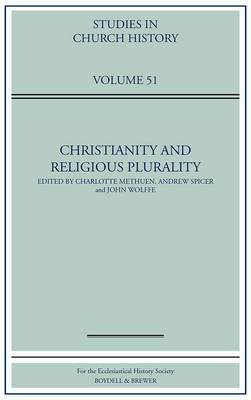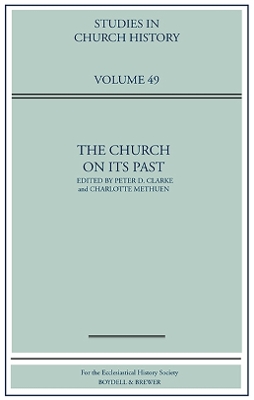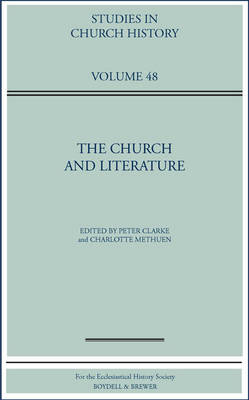Studies in Church History
3 total works
v. 51
Christianity and Religious Plurality
by Ms Charlotte Methuen, Professor Andrew Spicer, and John Wolffe
Published 21 May 2015
This, the fifty-first volume of Studies in Church History, takes as its theme 'Christianity and Religious Plurality'. The focus is on exploring the practical experience of Christians, who have often existed in a world of manifold belief systems and religious practices. Under the Presidency of Professor John Wolffe, the summer conference and winter volume brought together a fascinating series of lectures and communications, a selection of which arecollected in this peer-reviewed volume. Three main areas of engagement emerge: contexts where Christianity was a minority faith, whether in the earliest years of the church, in the Mongol empire of the thirteenth century or under Ottoman rule in the fifteenth, or in contemporary Iraq, Egypt and Indonesia; responses to religious minorities in predominantly Christian societies, such as early-modern Malta or nineteenth- and twentieth-century London; and finally, Christian encounters with other religions in situations where no single tradition was obviously dominant. Offering an unusual perspective on Christian encounters with other faiths, this volume will appeal to students of religious studies and those interested in the cultural contexts in which Christianity has existed - and indeed continues to exist.
CHARLOTTE METHUEN is Senior Lecturer in Theology and Religious Studies at the University of Glasgow.
ANDREW SPICER is Professor of Early Modern European History at Oxford Brookes University.
JOHN WOLFFE is Professor of Religious History at The Open University.
Contributors: GARETH ATKINS, ANGELABERLIS, CLYDE BINFIELD, MARION BOWMAN, FRANS CIAPPARA, KRISTIAN GIRLING, BERNARD HAMILTON, A. D. R. HAYES, W. M. JACOB, JOHN MAIDEN, JAMES T. PALMER, KONSTANTINOS PAPASTATHIS, NABIL MATAR, CHARLOTTE METHUEN, STUART MEWS, ARIANA PATEY, JONATHAN PHILLIPS, AMANDA POWER, MONA SIDDIQUI, BRIAN STANLEY, GUY STROUMSA, TODD M. THOMPSON, CHRISTINE WALSH, PETER WEBSTER, MARTIN WELLINGS, JOHN WOLFFE, ANGELIKI ZIAKA
CHARLOTTE METHUEN is Senior Lecturer in Theology and Religious Studies at the University of Glasgow.
ANDREW SPICER is Professor of Early Modern European History at Oxford Brookes University.
JOHN WOLFFE is Professor of Religious History at The Open University.
Contributors: GARETH ATKINS, ANGELABERLIS, CLYDE BINFIELD, MARION BOWMAN, FRANS CIAPPARA, KRISTIAN GIRLING, BERNARD HAMILTON, A. D. R. HAYES, W. M. JACOB, JOHN MAIDEN, JAMES T. PALMER, KONSTANTINOS PAPASTATHIS, NABIL MATAR, CHARLOTTE METHUEN, STUART MEWS, ARIANA PATEY, JONATHAN PHILLIPS, AMANDA POWER, MONA SIDDIQUI, BRIAN STANLEY, GUY STROUMSA, TODD M. THOMPSON, CHRISTINE WALSH, PETER WEBSTER, MARTIN WELLINGS, JOHN WOLFFE, ANGELIKI ZIAKA
v. 49
The theme of this volume, The Church on its Past, was chosen to celebrate the fiftieth anniversary of the Ecclesiastical History Society. Under the Presidency of Professor Sarah Foot, this conference brought together leading scholars, among them Diarmaid MacCulloch, David Bebbington, Claudia Rapp and Matthew Grimley, to reflect on developments within the discipline of Church History in the fifty years since the Society's foundation in 1961. In this,the resulting volume, a first group of papers surveys ecclesiastical historiography over the last half-century, considering such key themes in Church History as the Reformation. Another group focuses on scholarship exploring therelationship between Church and State in different periods. A third group investigates the uses that the Christian churches have made of the past, especially in order to justify present agendas, and explores how those churches have constructed their own past. Traditionally much Church History has been written from the 'inside'; particular attention is paid to how the Catholic, non-conformist and evangelical churches have interpreted their own histories.
The volume ranges widely over historical writing about the Church, from Eusebius and Socrates Scholasticus in late antiquity through Bede and Cardinal Boso in the Middle Ages to Martin Luther, Polydore Vergil, John Bale and Gilbert Burnet in the early modern period, and beyond. Both Protestant and Catholic approaches to writing the history of the Reformation, and of the pre-Reformation Church, are explored, including such aspects as the papacy and crusading. The influence of other approaches is also considered, notably those attentive to feminism and gender, and how far Church Historians have engaged with these. The richness and breadth of this volume's treatment of such a major subject make it essential reading for all students and teachers of and others interested in Church History.
PETER CLARKE is Reader in Medieval History at the University of Southampton.
CHARLOTTE METHUEN isLecturer in Church History at the University of Glasgow.
The volume ranges widely over historical writing about the Church, from Eusebius and Socrates Scholasticus in late antiquity through Bede and Cardinal Boso in the Middle Ages to Martin Luther, Polydore Vergil, John Bale and Gilbert Burnet in the early modern period, and beyond. Both Protestant and Catholic approaches to writing the history of the Reformation, and of the pre-Reformation Church, are explored, including such aspects as the papacy and crusading. The influence of other approaches is also considered, notably those attentive to feminism and gender, and how far Church Historians have engaged with these. The richness and breadth of this volume's treatment of such a major subject make it essential reading for all students and teachers of and others interested in Church History.
PETER CLARKE is Reader in Medieval History at the University of Southampton.
CHARLOTTE METHUEN isLecturer in Church History at the University of Glasgow.
v. 48
Christianity and the book have been closely intertwined since the religion's very beginning. The Word itself takes a variety of literary forms: apologetic and polemic texts, sermons, poems, hymns, spiritual autobiography and Christian philosophical reflection. Likewise, many genres of novel, theatre and travel-writing often deal with Christian themes. This volume explores some of the ways in which the Church has both shaped and featured in the literature of different periods, with a particular emphasis on British literature in the nineteenth and twentieth centuries.
The understanding of literature invoked here is a catholic one, reflecting the universality of Christianity itself, and allowing the exploration of a range of forms of writing emerging in the course of the Church's history. Among the authors discussed are Thomas More, John Milton, Isaac Williams, W. E. Heygate, Charles Dickens, Benjamin Disraeli, Edna Lyall, Silas and Joseph Hocking, Robert Browning, Charles Williams, Canon Patrick Augustine Sheehan, Dame Rose Macauley, D. H. Lawrence, W. H. Auden and Ellis Peters. Through this wide-ranging and impressive collection, The Church and Literature illuminates the enduring relationship between the Church and literary creation. Both literary scholars and historians with an interest in Christian culture will find this book invaluable.
PETER CLARKE is Reader in Medieval History at the University of Southampton.
CHARLOTTE METHUEN is Lecturer in Church History at the University of Glasgow.
Contributors: Daniel Anlezark, Clyde Binfield, John Boneham, Philip Broadhead, David Brooks, Renie Choy, Thomas N. Corns, Eamon Duffy, David N. Dumville, Jessica Lee Ehinger, Benjamin L. Fischer, Sarah Foot, Sheridan Gilley, Crawford Gribben, Bernard Hamilton, Colin Haydon, George Herring, Kathleen Jaeger, Oliver Logan, Judith Maltby, Stuart Mews, Katharine K. Olson, George Oppitz-Trotman, W. B. Patterson, Salvador Ryan, Andrew Sanders, Mark Smith, Martin Spence, John Took, Caroline Watkinson, Peter Webster,Martin Wellings, John Wolffe
The understanding of literature invoked here is a catholic one, reflecting the universality of Christianity itself, and allowing the exploration of a range of forms of writing emerging in the course of the Church's history. Among the authors discussed are Thomas More, John Milton, Isaac Williams, W. E. Heygate, Charles Dickens, Benjamin Disraeli, Edna Lyall, Silas and Joseph Hocking, Robert Browning, Charles Williams, Canon Patrick Augustine Sheehan, Dame Rose Macauley, D. H. Lawrence, W. H. Auden and Ellis Peters. Through this wide-ranging and impressive collection, The Church and Literature illuminates the enduring relationship between the Church and literary creation. Both literary scholars and historians with an interest in Christian culture will find this book invaluable.
PETER CLARKE is Reader in Medieval History at the University of Southampton.
CHARLOTTE METHUEN is Lecturer in Church History at the University of Glasgow.
Contributors: Daniel Anlezark, Clyde Binfield, John Boneham, Philip Broadhead, David Brooks, Renie Choy, Thomas N. Corns, Eamon Duffy, David N. Dumville, Jessica Lee Ehinger, Benjamin L. Fischer, Sarah Foot, Sheridan Gilley, Crawford Gribben, Bernard Hamilton, Colin Haydon, George Herring, Kathleen Jaeger, Oliver Logan, Judith Maltby, Stuart Mews, Katharine K. Olson, George Oppitz-Trotman, W. B. Patterson, Salvador Ryan, Andrew Sanders, Mark Smith, Martin Spence, John Took, Caroline Watkinson, Peter Webster,Martin Wellings, John Wolffe


